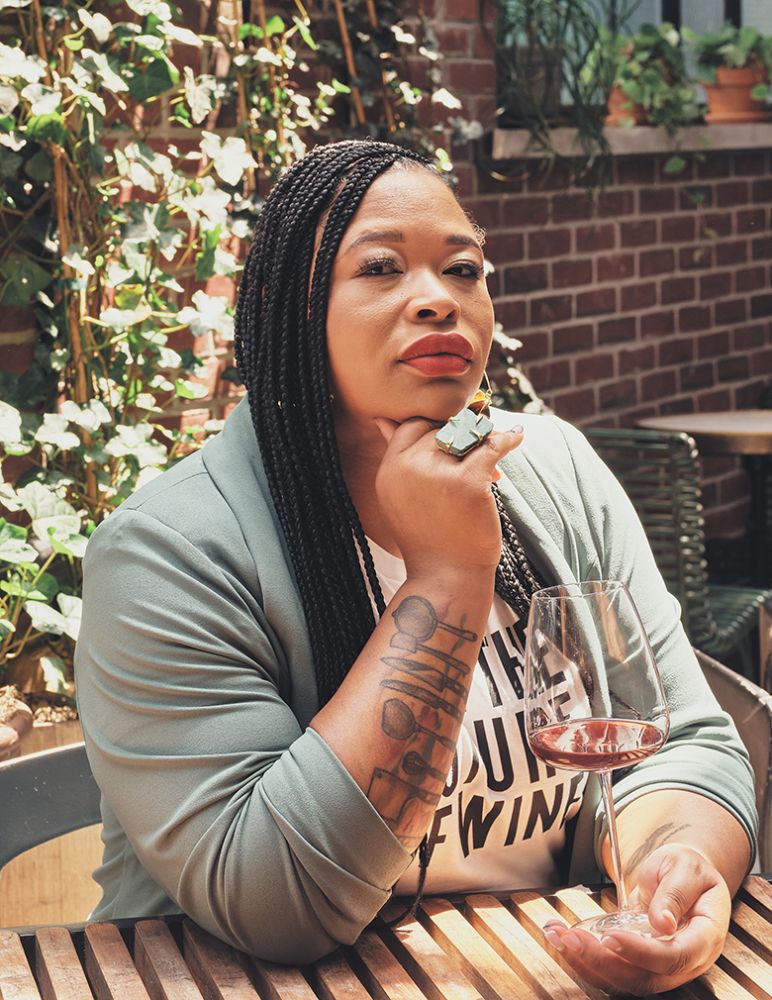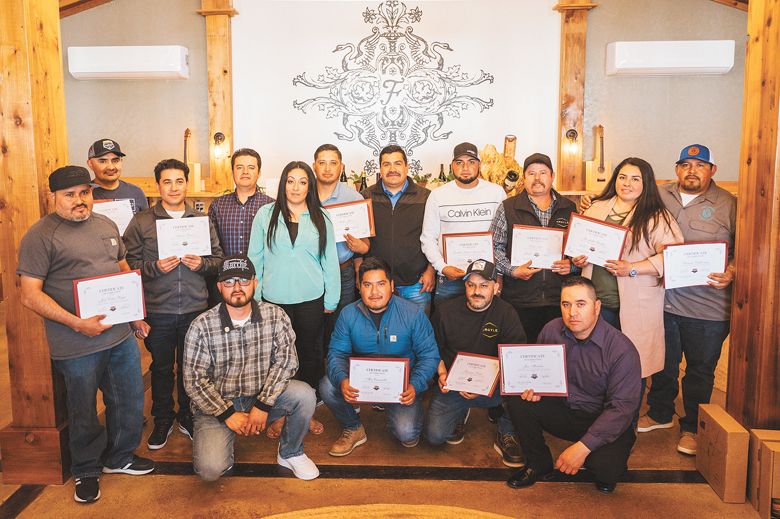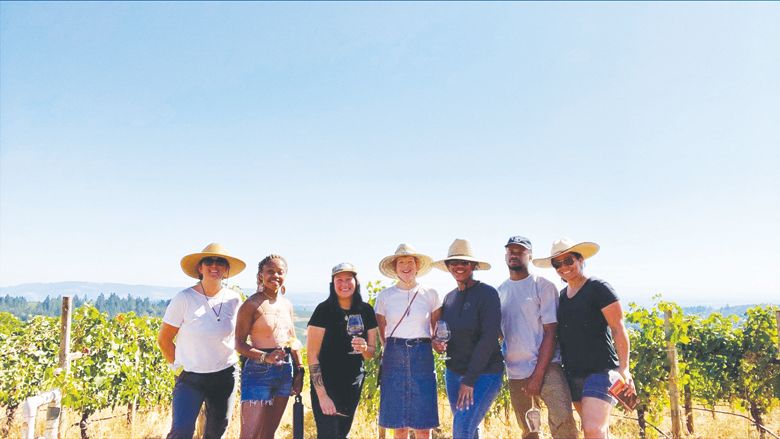Mission: Inclusion
Social justice in the wine world



By Annelise Kelly
Diversity and inclusion conversations happen everywhere today. The wine industry is no exception. Winemaking culture is relatively homogeneous and may not feel accessible or hospitable to aspiring Black, Indigenous, People of Color, or BIPOC, individuals eager to participate in the crafting or purveying of the beloved beverage. However, a few successful people of color in the wine industry are promoting change by offering institutional support to these newcomers. Such organizations are united in their collective mission to improve access and support for BIPOC individuals in the wine community.
At the national level, The Roots Fund assists BIPOC people throughout the United States pursue careers in the wine industry. It offers financial support, mentorship, education and job placement. Here in Oregon, we have two Willamette Valley-based organizations. Asociación Hispana de la Industria del Vino en Oregon y Comunidad, commonly known as AHIVOY, provides education to the Latinx and Hispanic communities, helping members advance in the wine industry. Our Legacy Harvested operates an internship program for BIPOC individuals to establish wine careers in Oregon.
We spoke to leaders of each organization to learn more about making the wine industry more inclusive, enriching it with the unique talents and dedication of a diverse community of future leaders.
THE ROOTS FUND
The Roots Fund was founded in 2020 with a mission “to empower BIPOC in the wine industry by providing resources and financial support, through educational scholarships, wine education, mentorship, and job placement,” according to its website.
Co-founder and CEO Ikimi Dubose-Woodson says the program has assisted more than 220 participants and granted over $2.2 million in scholarships. “We help U.S. residents around the entire country, and through our enrichment trip program, they travel throughout the world studying wine with us.”
Dubose-Woodson, with fellow co-founders Carlton McCoy, Jr., and sommelier Tahiirah Habibi, “just wanted to see more people in the room that looked like us.” All three had experience working in restaurants as chefs, sommeliers and/or front of the house, and became increasingly involved in wine. They recognized how networking, mentorship and supportive bosses were crucial to their success. “We knew many people of color were trying to work in the wine space and needed support, so we built the organization around this idea.”
The Roots Fund’s first participant, Daren Clark, represents a glowing success story. As a chef displaced by the initial wave of the COVID pandemic, “he came to us and wanted to get into working in production, working in vineyards. He was kind of our test case for many things: our first relationships with France, building our internship program, our relationships with colleges. We put Daren through the enology program at U.C. Davis. He’s graduating this summer, so that’s absolutely amazing.”
After stints overseas in France and New Zealand, he now works for Domaine Drouhin in Dayton. “He’s probably our biggest success, very well into his first assistant winemaker position this summer once he graduates, and it just shows you the length and capacity of our work.”
Dubose-Woodson emphasizes the organization isn’t simply about supplying monetary support. “Now Daren’s been able to successfully gain employment, which is the ultimate goal of our organization.”
While partners such as Véronique Boss-Drouhin, head winemaker at Domaine Drouhin, have been extremely supportive, Dubose-Woodson acknowledges that potential partners are not always instantly receptive. “Often people think, how much work am I going to have to put in to work with you? And I tell people all the time: our organization is flexible, and I want to meet you where you’re at. I don’t want to do anything new with you because it won’t resonate with you and your team won’t want to be a part of it. So, let’s figure out– how do we build an organic relationship that’s beneficial to both parties?”
“I am excited to see wineries, especially in places like Oregon, who I think don’t always get the recognition they deserve for putting out great wines; really thinking outside the box to create spaces for more diverse community in their tasting rooms,” says Dubose-Woodson. “The way forward really is having a more inclusive winery industry.”
AHIVOY
AHIVOY is a nonprofit creating opportunities for and empowering Latinx and Hispanic vineyard workers. According to its website, the organization provides “education and professional development, paving the way for our hardest-working community members to support their families and establish careers in the wine industry.”
The organization was established in 2019 by four prominent Hispanic members of the wine community: the late Jesús Guillén, along with Yuliana Cisneros-Guillén of Guillen Family Wines; Miguel Lopez, owner of Red Dirt Vineyard Management; and Sofía Torres-McKay, co-owner of Cramoisi Vineyard.
According to DeAnna Ornelas, AHIVOY president, “They got together and said ‘there’s a lot of potential out in the vineyard, and education is really what has gotten us further in life. Let’s see if we can use what we’ve done in our careers to help others, especially those out in the vineyards, the vineyard stewards’.” AHIVOY partners with Chemeketa Community College in Salem and Linfield University in McMinnville, offering a free 17-week course encompassing all aspects of the wine industry, including enology, viticulture, winemaking, marketing, sales and wine tasting.
The program takes place one day each week during the slower winter months, between January and the end of April. AHIVOY provides a stipend to compensate for lost wages. Up to 20 vineyard stewards, primarily employed in the cellar or agricultural side of the wine world, benefit from classes, field trips and practical education taught in both English and Spanish.
“We’ve learned an educated community is a healthy community overall,” says Ornelas. “If the people out in the vineyard know more, they’re going to help us make better wine. We want to take what those vineyard stewards already know and boost that, build upon that.”
“We find plenty of employers discover this program is a real benefit,” continues Ornelas. “I think these vineyard stewards, once they know their employer is willing to invest in them, definitely feel more trust. Plus, wineries have a more invested worker. Folks who finish our program definitely display more confidence and leadership when they go back to their place of business.”
Success stories include graduate and vineyard manager Alejandro Avalos, who earned a 2023 Oregon Wine Industry Vineyard Excellence Award; Ivan George, recipient of a 2024 Oregon Wine Industry Vineyard Excellence Award; another graduate who leases his own vineyard and sells grapes; and others who proceed to earn their GED certificates.
OUR LEGACY HARVESTED
Our Legacy Harvested, or OLH, was also founded in 2020 “to educate, advance and empower the BIPOC community in the wine industry.” OLH places BIPOC interns at Willamette Valley wineries into four-month paid internships focusing on viticulture, harvest and winemaking. Housing in McMinnville and transportation are included, along with networking, field trips and social opportunities within Oregon’s wine country.
“At Our Legacy Harvested, we are starting people in wine specifically in the Willamette Valley because it’s where my wine journey began,” says founder Tiquette Bramlett. Currently, the vice president of Chosen Family Wines, Bramlett is the former president of Compris Vineyard in Newberg– one of very rare Black women in such positions.
“One thing I’ve always appreciated is the connection to community here and having the opportunity to get people plugged in.” Bramlett observes that “with people of color, when you’re looking around in the wine industry, you don’t necessarily see a lot of us in the space. And so, you’re saying, ‘okay, what does my community look like? What’s going to keep me rooted?’”
Novices to the industry lack access to influential people and businesses. “Often, you don’t know where to start nor who to go to. We point people in the right direction,” says Bramlett. “If you have a particular passion for something in this area, we want to be able to connect you. We want people to create their own journey in this process. I think it’s important for anybody– but especially in the BIPOC community–to know that we can count on each other.”
WHAT DOES INCLUSION LOOK LIKE?
Asked about her vision for inclusivity, Bramlett says “It’s going to be at its best when organizations like mine and The Roots Fund and AHIVOY will no longer be necessary. I think we’re definitely moving in the direction of having the important, larger conversations, which is incredibly impactful. But I think the moment we really arrive is when our programs aren’t needed anymore.”
“Seeing people who better represent our country, our community. That’s really what inclusivity looks like for us in the wine space,” says Dubose-Woodson. “But even in places where you may not find people who look like you, making sure you’re walking into an environment where people are receptive of you, entering more welcoming spaces.”
“We’re adding diversity in the landscape,” observes Ornelas. “We’re making that connection from vineyard to bottle and into the tasting room. I think folks in the tasting room are having more conversations about who’s picking the grapes and where the wine is coming from. We talk about sustainability and the products we use on our vines, and we’re looking at it from a social sustainability perspective as well. It’s the right thing to do, especially for Black and Brown people who have been at the margins of wine for so long. We are strengthening the Oregon wine industry by empowering vineyard stewards through education.”
“As a member of our wine community, I want to leave it better than I found it,” says Ornelas. “Our goal at AHIVOY is to make a measurable impact. Hopefully, one day there won’t be a need for organizations like ours. Everybody will just be on the same footing. There’ll be equality and equity for all, but, until then, we’re going to continue to do this.”
After living in Denmark, the Netherlands, L.A. and the Bay Area, writer Annelise Kelly settled in Portland, where she delights in food carts, Douglas firs, dancing and getting crafty. Thanks to Annelise’s broad interests, her career path has weaved through cooking, events, technical writing, decorative painting and retail display.Wanderlust takes her across borders and oceans every chance she gets. Connect with Annelise at www.annelisekelly.com.










